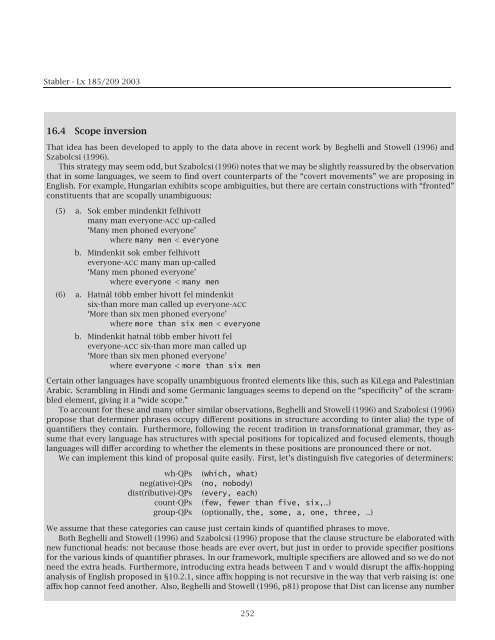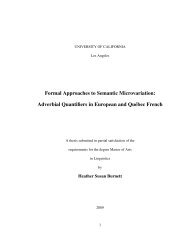Notes on computational linguistics.pdf - UCLA Department of ...
Notes on computational linguistics.pdf - UCLA Department of ...
Notes on computational linguistics.pdf - UCLA Department of ...
Create successful ePaper yourself
Turn your PDF publications into a flip-book with our unique Google optimized e-Paper software.
Stabler - Lx 185/209 2003<br />
16.4 Scope inversi<strong>on</strong><br />
That idea has been developed to apply to the data above in recent work by Beghelli and Stowell (1996) and<br />
Szabolcsi (1996).<br />
This strategy may seem odd, but Szabolcsi (1996) notes that we may be slightly reassured by the observati<strong>on</strong><br />
that in some languages, we seem to find overt counterparts <strong>of</strong> the “covert movements” we are proposing in<br />
English. For example, Hungarian exhibits scope ambiguities, but there are certain c<strong>on</strong>structi<strong>on</strong>s with “fr<strong>on</strong>ted”<br />
c<strong>on</strong>stituents that are scopally unambiguous:<br />
(5) a. Sok ember mindenkit felhívott<br />
many man every<strong>on</strong>e-acc up-called<br />
‘Many men ph<strong>on</strong>ed every<strong>on</strong>e’<br />
where many men < every<strong>on</strong>e<br />
b. Mindenkit sok ember felhívott<br />
every<strong>on</strong>e-acc many man up-called<br />
‘Many men ph<strong>on</strong>ed every<strong>on</strong>e’<br />
where every<strong>on</strong>e < many men<br />
(6) a. Hatnál több ember hívott fel mindenkit<br />
six-than more man called up every<strong>on</strong>e-acc<br />
‘More than six men ph<strong>on</strong>ed every<strong>on</strong>e’<br />
where more than six men < every<strong>on</strong>e<br />
b. Mindenkit hatnál több ember hívott fel<br />
every<strong>on</strong>e-acc six-than more man called up<br />
‘More than six men ph<strong>on</strong>ed every<strong>on</strong>e’<br />
where every<strong>on</strong>e < more than six men<br />
Certain other languages have scopally unambiguous fr<strong>on</strong>ted elements like this, such as KiLega and Palestinian<br />
Arabic. Scrambling in Hindi and some Germanic languages seems to depend <strong>on</strong> the “specificity” <strong>of</strong> the scrambled<br />
element, giving it a “wide scope.”<br />
To account for these and many other similar observati<strong>on</strong>s, Beghelli and Stowell (1996) and Szabolcsi (1996)<br />
propose that determiner phrases occupy different positi<strong>on</strong>s in structure according to (inter alia) the type <strong>of</strong><br />
quantifiers they c<strong>on</strong>tain. Furthermore, following the recent traditi<strong>on</strong> in transformati<strong>on</strong>al grammar, they assume<br />
that every language has structures with special positi<strong>on</strong>s for topicalized and focused elements, though<br />
languages will differ according to whether the elements in these positi<strong>on</strong>s are pr<strong>on</strong>ounced there or not.<br />
We can implement this kind <strong>of</strong> proposal quite easily. First, let’s distinguish five categories <strong>of</strong> determiners:<br />
wh-QPs (which, what)<br />
neg(ative)-QPs (no, nobody)<br />
dist(ributive)-QPs (every, each)<br />
count-QPs (few, fewer than five, six,…)<br />
group-QPs (opti<strong>on</strong>ally, the, some, a, <strong>on</strong>e, three, …)<br />
We assume that these categories can cause just certain kinds <strong>of</strong> quantified phrases to move.<br />
Both Beghelli and Stowell (1996) and Szabolcsi (1996) propose that the clause structure be elaborated with<br />
new functi<strong>on</strong>al heads: not because those heads are ever overt, but just in order to provide specifier positi<strong>on</strong>s<br />
for the various kinds <strong>of</strong> quantifier phrases. In our framework, multiple specifiers are allowed and so we do not<br />
need the extra heads. Furthermore, introducing extra heads between T and v would disrupt the affix-hopping<br />
analysis <strong>of</strong> English proposed in §10.2.1, since affix hopping is not recursive in the way that verb raising is: <strong>on</strong>e<br />
affix hop cannot feed another. Also, Beghelli and Stowell (1996, p81) propose that Dist can license any number<br />
252
















